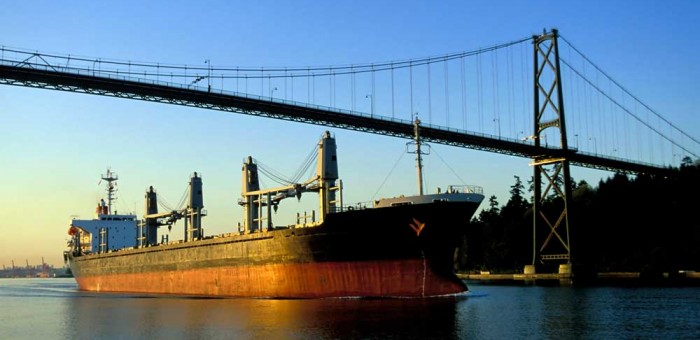Heavy Oil Pipelines: Facts, Questions and My Assessment
Facts and Questions
Fact 1: Currently, 300,000 barrels of heavy oil are transported across B.C. in Kinder Morgan’s Trans Mountain pipeline each day. Kinder Morgan plans to nearly triple this capacity while Enbridge has applied to build a new pipeline to the west coast. If approved, the two pipelines would increase the amount of heavy oil coming to our coast to a total of 1,415,000 barrels per day. In addition to the pipeline proposals, rail options are also being considered to transport up to 525,000 barrels of heavy oil to the B.C. coast each day.
Fact 2: According to (1) Premier Christy Clark, (2) the reports commissioned by the Ministry of the Environment and (3) the Province’s submission to the Joint Review Panel on the Northern Gateway Pipeline, British Columbia is woefully unprepared for a heavy oil spill. The Province’s submission also states that regardless of whether or not additional resources are committed, effective spill response is “impossible or severely constrained” in certain regions of the province.
Comment: I applaud the Premier for being consistent in requiring five conditions to be met before supporting enhanced heavy oil tanker traffic on the coast. I also applaud her for publicly recognizing the fact that B.C. is woefully unprepared for a heavy oil spill. Yet at the same time as the Premier is recognizing this, she is also signalling that progress is being made in meetings with Alberta Premier Alison Redford towards meeting her government’s five conditions.
My concern is that because global knowledge of diluted bitumen is so limited, the government’s current standard of “world-leading” is actually a very low standard that, frankly speaking, could easily be met without ever developing a truly effective spill response capacity. In other words, “world-leading” standards will not protect our coast from a heavy oil spill. I have therefore asked the Premier in an open letter to clarify what criteria her government uses to evaluate a “world-leading” or “effective” spill response capacity. Only by having this information can we make a fully informed choice about whether the likely benefits outweigh the enormous risks.
Fact 3: Proposals to build refineries that can turn bitumen into value-added products prior to export are already being considered in both B.C. and Alberta. Proponents of these refineries argue that it would stimulate more investment and jobs here in Canada, meaning we would exact greater gains from our limited natural resources.
Fact 4: Refined oils are, comparatively speaking, much safer to transport than diluted bitumen. There is significantly more knowledge of how to clean up refined oils, including existing procedures, protocols, equipment and expertise. According to documents from the Department of Fisheries and Oceans (DFO), this knowledge does not currently exist for bitumen, meaning it is much more dangerous to transport.
Comment: The plan to transport diluted bitumen by pipeline across B.C. for export to international markets is both environmentally risky and economically short-sited. It is looking for the quick dollar at the expense of a potentially bigger dollar—and our environment.
If we are going to continue developing the Alberta oil sands, and if oil sands products are going to be transported across B.C., then shouldn’t we seriously consider exporting refined products like gasoline and jet-fuel instead of diluted bitumen?
Refined products could sell for higher prices and stimulate the development of value-added industries (including petrochemical industries). Exporting refined, as opposed to raw, products could create more local jobs in Canada while eliminating the risk of a dilbit spill on our coastline. Taking this further, refining bitumen close to where it is extracted would also minimize the risk of a land-based dilbit spill from a leaking pipeline.
My Assessment
The threat of a heavy oil spill on the B.C. coast is not a distant possibility. Tankers leave from Vancouver habour ever week and if the Northern Gateway and Trans Mountain pipeline proposals are approved, the number of tankers will increase dramatically.
Some risks are necessary; others are not. While Premier Christy Clark has publicly recognized that B.C. is “woefully” unprepared for a heavy oil spill, the Province’s submission to the Joint Review Panel for the Northern Gateway pipeline has clearly stated that effective spill response is “impossible or severely constrained” in certain regions of the province. Meanwhile, the Department of Fisheries and Oceans has made it clear that not enough is known about what would happen to diluted bitumen were it to spill into the ocean.
The chances that a heavy oil spill will occur may be small, but the risks are massive—not just the environmental risks but also the economic risks. What would happen to the tourism or fishery industries if there was a spill in or near Vancouver habour?
The more we increase the number of heavy oil tankers, the higher the chance that a spill will occur. We need to be smart about how we manage this risk and to recognize that, in some cases, if we cannot manage the risk, we should not be shipping the product.
I have therefore proposed two ideas:
- I have called for a moratorium on tankers carrying diluted bitumen on the B.C. coast.
- I have proposed that if we are going to continue developing the Alberta oil sands, and if that oil is going to cross B.C., then at the very least, we should seriously consider refining it into value-added products prior to transportation and export, in order to increase the economic benefits and decrease the environmental risks.
Further Reading
Christy Clark’s statement to Mansbridge: http://www.cbc.ca/news/politics/christy-clark-warns-canada-unprepared-for-tanker-oil-spills-1.1876514
Five conditions for heavy oil pipelines: http://www.newsroom.gov.bc.ca/2012/07/british-columbia-outlines-requirements-for-heavy-oil-pipeline-consideration.html
Spill response reports: http://www.env.gov.bc.ca/main/west-coast-spill-response-study/
Province’s submission on Northern Gateway: http://www.env.gov.bc.ca/main/docs/2013/BC-Submission-to-NGP-JointReviewPanel_130531.pdf
Oil by rail: http://www.cbc.ca/news/canada/british-columbia/cn-feds-eyeing-oil-by-rail-to-prince-rupert-b-c-1.1863916
Comments are closed.




